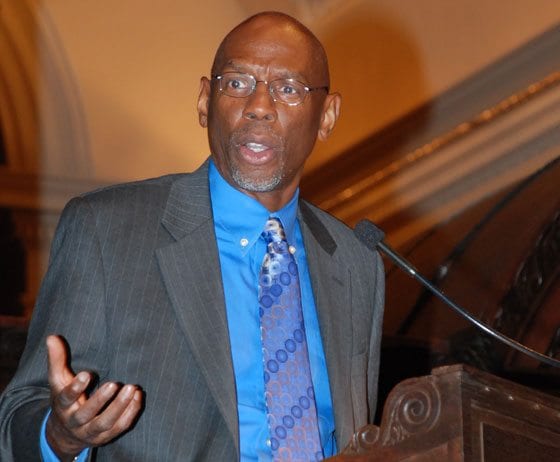
As Geoffrey Canada stood in front of the packed crowd at the Memorial Church at Harvard University last week, the 2009 Robert Coles “Call of Service” award recipient captured the attention of all in attendance.
His energetic speech detailed the creation of the successful Harlem Children’s Zone (HCZ), of which he serves as President and CEO.
According to Canada, the approach of his organization’s work began with his assessment that the current education system in America is dramatically underserving its children.
“We have decided that we can give the American children a lousy education,” said Canada. “We know that in the end they’re not going to be able to work and they’re probably going to end up breaking the law and then we’re just going to arrest them and lock them up.”
Canada took part in a study entitled “The Cradle to Prison Pipeline,” which showed that there were certain parts of the country where from a very early age a child’s path to prison could be predicted.
“In some places of this country we make one guarantee to children,” he said. “We don’t guarantee them jobs, we don’t guarantee them a place in college, we guarantee that if they mess up we will put them in jail. That is the certainty that we make in those communities. There is a pipeline and we know where these pipelines exist.”
According to Canada’s statistics, there are now about 500,000 black males serving time in prison, while fewer than 40,000 black males earn a bachelor’s degree each year.
“I have become convinced that unless we do something radically different in educating our most vulnerable children, there is no way that we will remain the kind of superpower this country is today,” said Canada. “I am convinced that this is a crisis. We’re in the midst of it and the American people don’t realize what a crisis this is.”
The event was hosted by the Phillips Brooks Housing Association, which made Canada the third person to receive the “Call of Service” award for promoting a deeper engagement in public service.
The HCZ, which evolved from the Rheedlen Centers for Children and Families under the direction of Canada throughout the 1990s, began by providing expansive services to what began as a 24-block area in 1997 and grew into a 97-block area by 2007. At the time, the HCZ provided services to 7,400 children and 4,100 adults, according to the organization’s Web site.
In 2008, 10,883 youths were served by the HCZ.
With programs that aim to serve almost every aspect of life, such as those that teach child-rearing skills to new parents, pre-school programs, charter schools, after-school programs and health care programs, HCZ aims to address every individual social problem that can contribute to an all-encompassing vicious cycle of poverty.
According to the HCZ website, 100 percent of students in the Harlem Gems pre-K program were found to be school-ready for the sixth year in a row.
The crowd seemed to exude raw adulation for Canada and his uncanny knack to captivate an audience.
“I think he was really inspiring,” said Michelle Rusch, a 22-year-old graduate student who was in attendance. “The way in which he delivers his message makes people believe they can achieve something.”
Recognition of Canada’s success has reached as far as the White House, where last May, President Barack Obama announced his plan for the creation of 20 “Promise Neighborhoods” throughout the country that will be modeled after the HCZ.
A collection of activists from Boston, including representatives from non-profit organizations, is in the planning stages of creating its own version of the HCZ outside of Obama’s plan.
“We have these persistent poverty problems that have gone on for generations and we’re not getting the results we need to get with the existing service delivery systems and so we’ve got to do something very differently,” said Hubie Jones, a charter trustee of the City Year board of directors who is also helping lead the effort to create the HCZ-inspired program in Boston. “We’ve got to think differently, we’ve got to come up with new strategies, new theories of change, and that’s the work that we’re doing.”
According to Jones, the program will focus on Roxbury, North Dorchester and Mattapan with Blue Hill Avenue acting as the backbone of the intended area of coverage.
“We just have a whole group of people that are very invested in the community who want something different,” said Jones.
Although plans for the program are far from being ready for a public presentation, Jones is confident that a proposal will be ready by the end of December.






